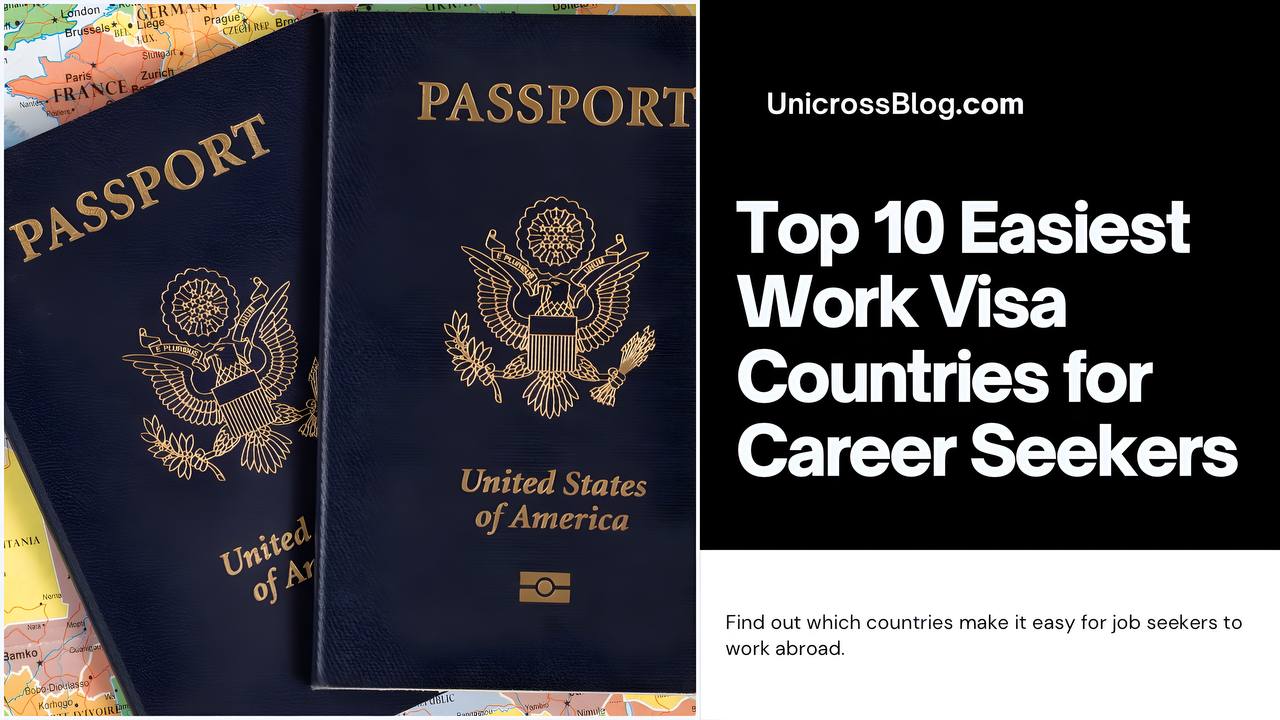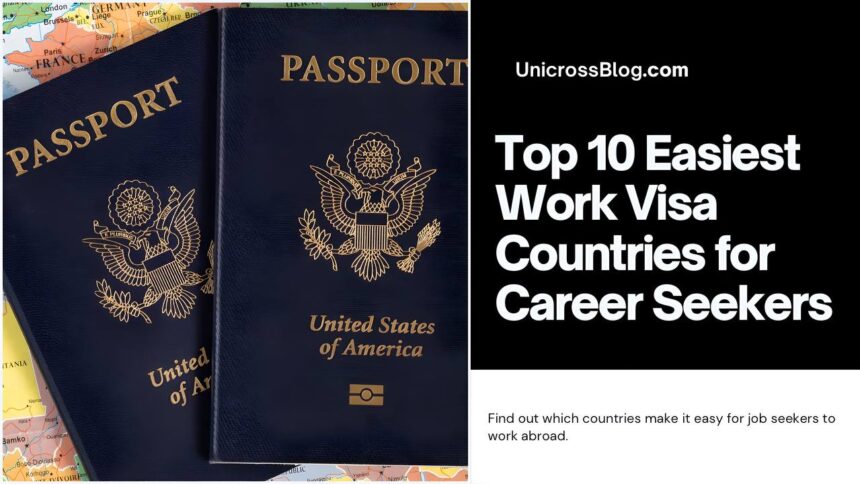2023/2024 Top 10 Easiest Work Visa Countries for Career Seekers: Not everyone can be sure they will find a permanent high-paying job with a good salary package in their country. But you can easily find a high-paying job abroad. To do that, you will need a work visa, and this article will list some countries where getting a work visa is pretty easy in 2023.
Moving to a new country to start a job can be stressful because you must do many things at once, like applying for a work visa, getting there, setting up a place to live, and starting your new job. Applying for a foreign work visa is long and complicated, but luckily, some countries are easier to get into than others, and the overall pricing is lower.
What is a Work Visa?
A work visa, also known as an employment visa or international work permit, is like your official ticket to work legally in a different country. It’s like getting a special permit that lets you take on a job in another country. Each country has its own rules and paperwork for granting this permission, so it’s important to understand the specific requirements for working abroad.
What do you need?
To apply for a work visa, you typically need:
- A job offer from an employer in the country
- Proof you meet the skills and experience required for the job
- Evidence you can support yourself financially
- A valid passport
- Application forms and fees
- Health insurance for some countries
The specific documents vary but usually include things like:
- Resume and references
- Bank statements
- University degrees or training certificates
- Language test scores for some roles
How do you apply?
The application process usually involves:
- Finding a job and getting a written offer from the employer
- Determining which work visa category you need based on your skills, experience, and job offer
- Completing the necessary application forms
- Submitting your documents and application fees
- Interviewing at an embassy or consulate, in some cases
- Waiting for a decision on your application, which can take weeks or months
- Receive your work visa stamped in your passport if approved!
With some advance planning, obtaining a work visa for one of the easiest countries can open you up to new career opportunities on a global scale. The challenges of the application process are often well worth the rewards.
READ ALSO: ADVANCE.AI: Requirements for a Senior Algorithm Role
Purpose of Work Visa

So you’ve got your eye on an international job opportunity, but first, you’ll need to secure a work visa for your destination country. The purpose of a work visa is to allow you to legally live and work in another country for a fixed period. Some countries make the process relatively straightforward, while others can be more challenging.
Top 10 Easiest Work Visa Countries for Career Seekers
Below are some of the 10 easiest work visa countries for career seekers:
- Germany
- Canada
- Australia
- Netherlands
- Singapore
- Ireland
- China
- Malaysia
- Poland
- New Zealand
Eligibility Criteria And Requirements of Work Visa
You must meet certain eligibility criteria to obtain a work visa for any of these countries. The specific requirements vary for each country but typically include the following:
1. Educational qualifications
Most countries require a bachelor’s degree or equivalent in a relevant field. Some may accept vocational training, work experience, or other credentials instead of a degree.
2. A job offer
Securing a job offer from an employer in the destination country is usually mandatory. The offer must be for a role that matches your qualifications and experience. Some countries have skills shortage lists that prioritize occupations in high demand.
3. Language proficiency
Some work visas may require proficiency in the country’s official language(s). This could mean passing a language test to demonstrate your reading, writing, speaking, and listening skills.
4. Health insurance
Private medical insurance coverage is frequently a prerequisite to obtaining a work visa. The policy must meet the minimum requirements set by the country’s healthcare and immigration authorities.
5. Funds requirement
Some countries mandate that you show proof of sufficient funds to support yourself for a certain period after entering the country. The amount can vary but is typically a few thousand dollars.
The specific eligibility criteria and requirements for each country’s work visa program can be found on the official government websites. Be prepared for additional paperwork, background checks, application fees, and different processing times for each nation. With the right qualifications and patience, you’ll be on your way to an international career adventure!
READ ALSO: Visa and Immigration Guide for Students: What Every Student Needs to Know
Duration of Work Visa
The work visa duration will determine how long you can stay in the country for work. Some countries offer short-term work visas for a few months, while others provide longer visas for up to 5 years. The visa duration often depends on the specific job or company sponsoring you.
For those wanting a longer-term work abroad experience, aim for countries offering 12 months or more. For example, New Zealand’s Essential Skills work visa is valid for up to 5 years. Germany’s EU Blue Card is granted for up to 4 years. Australia’s Skilled Independent visa (Subclass 189) provides permanent residency.
A short-term work visa may suit you better if you test out a new country or career path. Countries like Ireland, Singapore, and the Czech Republic offer work visas for 6-12 months. These provide a chance to gain international work experience without a long-term commitment. Some countries like the UK, Denmark, and Poland also allow you to extend a short-term work visa to stay longer.
The work visa duration is an important factor to consider based on your career and lifestyle goals. Consider whether you want an extended period abroad to build your experience or prefer shorter stints to work in various countries. The visa length will also impact costs, as shorter visas typically have lower application fees but may require more frequent renewals.
Do your research to determine which countries offer work visas that match your ideal time frame. A longer work visa provides more stability but less flexibility. A shorter visa allows you to experience different work cultures and countries but requires more frequent moves and job searches. Choose what suits your priorities and talents best!
Importance of Work Visa
A work visa allows you to legally work in another country. For career seekers, obtaining the proper work visa is crucial. Here are a few reasons why a work visa is so important:
1. Opens up more job opportunities
With a work visa, you can access jobs that would otherwise not be available as a foreigner. More companies will consider hiring you, knowing you already have legal authorization to work in that country.
2. Higher pay potential
In some countries, jobs that require work visas also tend to pay higher salaries. Companies understand that they need to provide attractive compensation to recruit top international talent.
3. Gain valuable experience
Working abroad allows you to gain experience that is valuable for career progression. You can learn new skills, expand your professional network, and enhance your cultural fluency – all of which make you a strong candidate for career growth.
4. Opportunity for permanent residence
Some work visas provide a path to permanent residence or citizenship over time. If you develop roots in a country and want to settle there long-term, a work visa is the first step toward that goal.
5. Tax benefits
Depending on the countries involved, you may be able to take advantage of tax treaties that exempt part of your income from double taxation or provide other tax benefits. Some countries also provide tax incentives for highly skilled foreign workers.
In summary, a work visa gives you more opportunities to progress in your career abroad. While the application process can be complicated, the rewards of obtaining a work visa make it worthwhile for motivated career seekers. With more jobs, higher pay, valuable experience, potential residency, and tax benefits, a work visa allows you to open up your career possibilities on the global stage.
Categories of Work Visa
Several types of work visas are available, depending on your skills, experience, and the country you want to work in. The most common categories are:
1. Temporary work visas
These visas allow you to work in a country for a limited time, usually up to 2 years. They are ideal for gaining international work experience or filling a temporary skills shortage. Types include work holiday visas for casual work and occupation-specific visas for teaching, nursing, or agriculture jobs.
2. Permanent work visas
These long-term visas provide a pathway to permanent residence. They target highly skilled workers and professionals in high-demand occupations. The visas often have a multi-stage application process, requiring a job offer and meeting language, skills, and experience requirements. Permanent visas include skilled worker visas, global talent visas, and employer-sponsored visas.
3. Business visas
These visas are for business people, investors, entrepreneurs, and self-employed professionals. They allow you to operate, invest in an existing business, or provide professional services in the country. Common types are self-employed visas, investor visas, and entrepreneur visas. You will typically need to demonstrate business experience, financial resources, and a viable business plan.
4. Work-to-residence visas
These transitional visas provide a path from temporary work to permanent residence. They initially allow you to work for a fixed term, during which you must meet requirements like a minimum income threshold or job offer to be eligible for permanent residence. New Zealand’s Skilled Migrant Category and Canada’s Express Entry program are examples.
The specific requirements and application process will depend on the country and visa category. Do thorough research on the options available and be prepared to provide evidence like skills assessments, health checks, and financial statements to support your application. With the right preparation, you can find welcoming countries that value your skills and experience.
Frequently Asked Questions About Work Visas
1. In what part of Europe is it easier to find a job?
- It is easier to get a job in Germany.
2. How much does getting a visa from Nigeria to the US in 2023 cost?
- It cost about $185
3. How long can I stay in the US without a visa?
- 90 days







